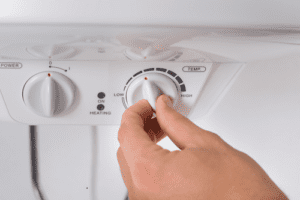 Every business seeks the best heating system for its needs, but there are many options. Most business owners don’t have the time to research the different types of heaters from scratch thoroughly, so we’re helping out. Today, we’re reviewing various kinds of geothermal heating for commercial use. After you read this post, you’ll have a good idea about the factors that go into choosing the system best suited to your circumstances. As always, a qualified HVAC contractor can help you figure out the ideal system, as each business is unique.
Every business seeks the best heating system for its needs, but there are many options. Most business owners don’t have the time to research the different types of heaters from scratch thoroughly, so we’re helping out. Today, we’re reviewing various kinds of geothermal heating for commercial use. After you read this post, you’ll have a good idea about the factors that go into choosing the system best suited to your circumstances. As always, a qualified HVAC contractor can help you figure out the ideal system, as each business is unique.
The Factors That Determine the Right System for You
Four major factors determine which systems you should consider:
- Geography and Logistics – You must first consider the amount of space around you. Often, technicians will dig into the ground a considerable amount to install the geothermal systems. Therefore, your building’s layout and the nearby ground can drastically affect your options, such as whether a pond or lake system is viable.
- Weather Patterns – Some geothermal systems rely on the ambient air remaining within certain temperatures. Others are impacted by the amount of rainfall that an area receives. Further, even the regular amount of sunlight that the land around your business takes in has an impact on how effective certain kinds of geothermal systems are.
- Available Capital – Some systems are more expensive than others. Thus, it’s understandable that your business may not necessarily have the capital available for some options. However, if you’re in the planning stages or are preemptively updating your heating system, you may be in a comfortable financial position to install a top of the line system.
- Soil Conditions – Another consideration is the quality and type of soil nearby. Soil’s thermal conductivity varies depending on the elements contained therein and the water content. Depending on the type of soil near your building, some systems may have an easier time heating and cooling your building as needed.
No two businesses are identical in their circumstances. However, experienced HVAC contractors have the know-how necessary to determine the best system for your situation. Next, we examine several kinds of geothermal heater that may work for your business.
Recognizing the Qualities of Different Types of Heaters
Once you examine the essential elements surrounding your building, you can choose between different types of heaters. Each geothermal system has its advantages and restrictions, so it’s vital to make the right choice. When you select the system that’s best suited to your business, you unlock maximum value from your geothermal heater. We’ll review several of the most common systems:
- Closed Loop Pipe Systems – These systems take advantage of the heat differential between the ground and your building. Essentially, they’ll move ambient heat to the ground when you need to cool the building in the summer and bring it in when it’s time to heat up during the winter. Depending on the land you have available, these systems can either be installed vertically or horizontally. It’s less expensive to do so horizontally, but that can only happen where you own a sizeable amount of the land adjacent to your building. While more expensive, vertical systems are better suited to urban settings and areas with taller buildings.
- Water Body System – As an alternative to the strictly-ground based systems, a system that uses a body of water can reduce the amount of piping needed. Since water is more conductive than soil, you can achieve a greater effect with less material. The tradeoff is that you obviously need to be near a lake or pond for this system to be an option.
- Open Loop Pipe System – Whereas a closed-loop uses an internal, recirculating mixture of water and antifreeze, an open-loop system draws in groundwater, flows it through your interior heat pump, then drains it out afterwards. This kind of system is mechanically more straightforward and easier to maintain but requires more specific circumstances. If your building is well-suited to it, you may strongly consider installing the open loop pipe system.
- Direct Exchange – All the prior systems distinguished between the circuit that heats and cools your business and the circuit that exchanges heat with the earth. Direct exchange eliminates the distinction and instead directly moves heat between the earth and the refrigerant. As a result, the system may cost less but be more vulnerable to temperature extremes.
Making the Right Decision Between Different Types of Heaters
When it comes to deciding between different types of heaters, there are significant benefits to any geothermal heater. However, your best bet is to consult a qualified HVAC contractor to determine the right fit for your business. Consider the factors and alternatives between geothermal heaters. With competent advice regarding your heating system, your business can save substantial amounts of overhead expenses while maintaining an excellent quality of life for both employees and clients.

